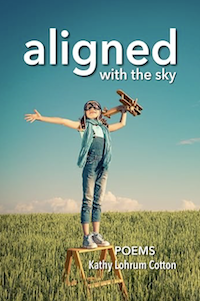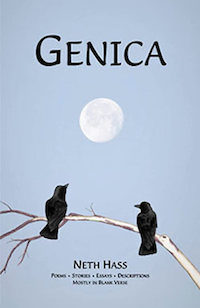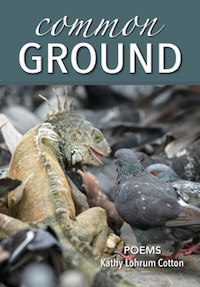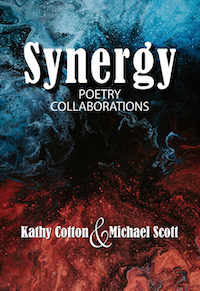
Reviews of ISPS Members' Poetry Books
Written by members of ISPS or NFSPS
Noon Out of Nowhere by Alan Harris
Aligned with the Sky by Kathy Lohrum Cotton
Genica by Neth Hass
Common Ground by Kathy Lohrum Cotton
Ripples of Air: Poems of Healing by Charlotte Digregorio
Images: a Collection of Ekphrastic Poetry by Michael Escoubas
Remember: Poems for the 20th Anniversary of 9/11
by Southern Chapter, Illinois State Poetry Society
Sherri (with an i): Poems of Love and Loss
by Sherri Lohrum Baker
Late Night Talk Show Fantasy & Other Poems
by Jennifer Dotson
Synergy: Poetry Collaborations
by Kathy Cotton & Michael Scott


Noon Out of Nowhere
by Alan Harris
Reviewed in Quill & Parchment
by Michael Escoubas

Aligned with the Sky by Kathy Lohrum Cotton
Review by jacob erin-cilberto

Reading Kathy Cotton's poetry is a literary journey up to that magic place above the clouds. It feels like a breath of Heaven as we might imagine it.
In "Rainclouds Over the City," she writes, "Today's leaden sky is heavy/ as Monday-morning traffic- / snarled and clogged with/ a million slow-moving tons/ of dark clouds that press spring's/ greens into deep shadows." Now, how is that for taking something so mundane as a dreary day of clouds and traffic, then turning it into classic personification that can cause the reader to smile at dark skies and rain? And at the end of this same poem, we join the band with "the percussion of thunder."
In "Tiny Dancer," she speaks of the "narrow cage," "Earthbound body" and "brilliant light spun out/ in lithesome twirling." Kathy's poetry certainly does spin brilliant light. She uncovers pain and turns it into words that somehow soothe our psyches. Everyone talks about the cost of pain and heartaches, yet this poet assuages that pain with "Just because/ the sun/ and sky/ and love/ are free/ I rejoice." Again, burdens of the heart and soul diminish as we read Cotton's poetry and our heaviness lifts.
"The Art of Happiness" is like a "how to" poem. It shows we need to "smile at a hundred reasons/ to feel good, wrap myself in the joy/ Of those who've loved me, those I love, / those whose love may come along/ this very moment while I practice/ the simple art of happiness." So many things we do in life require practice, but when do we think of practicing the art of happiness? And when do we think of happiness as an art? Sylvia Plath wrote, "dying is an art, like everything else, I do it exceptionally well."
Maybe it is time we took Kathy Cotton's advice and saw living in happiness as the preferred art. Poets don't write "happy stuff" very easily. But this poet manages to do that so well, and we slip into her poetry with smiles and end up quite "aligned with the sky." And we can certainly thank her for that journey and become "familiar with joy."
—jacob erin-cilberto, author of Haiku and Senryu You

Genica by Neth Hass
Review by Michael Escoubas

Celebrated Irish playwright, and social critic, George Bernard Shaw (1856-1950), once said,
"I want to be thoroughly used up when I die, for the harder I work, the more I live. I rejoice in life for its own sake."
I was reminded of Shaw's aphorism, as I worked my way through Neth Hass's Genica. I was struck by the depth of this writer's mind and the range of his interests. It is as if Hass and Shaw were cut from the same cloth. The lives and work of each demonstrate an uncommon [in this reviewer's mind] zest for life, attended by an eye for the anomalies of life.
The goal of this review is to drink from the well of Neth Hass's creative life and serve up an imaginative "cocktail" to you, my reader.
The materials contained in Genica comprise a 35-year-period of life-reflections. Over time these reflections found their way onto paper, went through careful stages of editing and revision, until "parts" of the poet's world became "the" world entitled Genica. The Author's Note at the end of the book explains how Hass arrived at the title and opens a window into the poet's life.
Neth Hass's writing is difficult to pigeonhole. That is, the lineage in most compositions resembles free verse poetry; other pieces such as "How Not To Write a Poem," present as essays, anecdotes, or short stories. Regardless of classification Hass's writing style is engaging, witty, and wise.
I get the feeling that the writer has made his share of mistakes in life. I say this because no one could write with such insight without having "messed up" a few times. Hass says to me, "Let's take a walk, I think the two of us may have a few things in common."
"Wild Raspberries," recalls a childhood memory where:
At the edge of the field, I step into tall grass
and negotiate a tangle of weedy brambles,
brush and saplings bound with various vines,
to access the luscious fruit, plump and black,
with sweet juice as red as any blood—
and tows and runs and ranks and racks of thorns
reaching for my blood as I step in
and discreetly insinuate myself among them.
This medium-length poem of 60 lines is replete with descriptions of a bird's nest containing "two small ivory eggs," an "intricate spider's net," and hidden things like ticks and chiggers, the armies of which will march up his legs, things that bite (flies and mosquitoes) and much more. This poem is a magnum opus of experiences the goal of which is to garner:
A bowl of sun-warmed berries in fresh cold milk—
cream, if you prefer—will be tastier
and more nutritious for having come
and shared in the ritual of blood sacrifice.
Ah yes! How this one spoke to my life at about age 12.
Speaking of youth, many poems serve as vivid flashbacks. For example, "Cadillac Heart Attack," is about two boys, one of whom could have been me, staffing a "full-service" gas station in the days before air-conditioning. The boys, covered in grease and sweat-drenched clothes, encounter "lush femininity" ... "overflowing her skimpy garments." Further details about those garments and what the girl says to the boys after "she rolled the window down," await the intrepid reader.
Poetry, it has been said, "Is a response to the daily necessity of getting the world right." Hass has thought deeply about the world. His meditative poem "Homeless" reads like a prayer. In it, the poet is on an extended winter walk. The "stirrings" of February weather "usher in the most tedious part of winter." The poet tries to walk off his homeless mood.
Each stanza places the reader in the landscape: "The snow lies out in tatters; the air is sweet / with half-forgotten aroma of quickening earth / and lush moss caps the peaks of rock in the creek bed / like a tiny forest on a miniature mountain range."
Throughout the poem, Hass ponders the meaning of homelessness. He and his canine companion, once abandoned with nowhere else to go, are a good fit. They pass through a neglected farm, bought and sold a hundred times, yet no one lives there. Time and abuse have laid waste to the poet's "sliver of paradise." The man and his companion encounter a deer herd, pensive at human presence, given the yearly autumn harvesting of their flesh. In a panic the herd disperses; a doe, in flight, becomes entangled in sharp fence wire. The poet is emotional in his concern for the wounded deer and hopes she and the herd will find each other. All of this and more become a metaphor for life, a meditation on the complexities of what it means to be human, on what it means to appreciate the time allotted to us on this earth.
I noted earlier that Neth Hass's poetry epitomizes a zest for life. A better word might be passion. Hass, a life-long carpenter, one who measures twice, cuts once, has created a poetic edifice that will stand the test of time.
It is little wonder that Genica was awarded the 2022 Book of the Year Prize by the Illinois State Poetry Society.
—Michael Escoubas

Common Ground by Kathy Lohrum Cotton
Review by jacob erin-cilberto

What can be said about Common Ground, a poetic offering from Kathy Lohrum Cotton? Her words are most relatable to both the avid poetic mind as well as the reader who might not have so much of a poetic leaning. As her "Words of Peace Villanelle" states:
"to find a common ground where conflicts cease
to rage alone, a place where pain abates
There is sweet symmetry in words of peace"
Now who cannot relate to these words? We all seek peace today in this world of unrest, many of us if not most rage alone and we can all find symmetry in words of peace. Hers really hit the mark and soften the heart.
In another poem, Kathy proclaims:
"I will be the word 'welcome'
Spoken by eyes and open hands
till we become
a fluent conversation."
There could not be a more fluent wordsmith than Kathy Cotton. She shows us how to construct "a mythic man/ from his finest qualities" and how to construct poems of the finest quality creating "a story she will recall/ all her remaining days."
I consider poets as artists and Kathy is that in every sense of the word "artist." She is well-known for mixing words with drawings, stripping life down to essentials, with no words wasted but rather reassembled to make what we can understand and relate to so easily. And she certainly sharpens them down "to a thing of beauty."
In one poem "Lipstick Over a Bruise," she writes:
"You live in the fluorescence of it,
A thousand-watt wish to burn off
the ever-clinging humidity of sadness
secreted beneath rugs and cushions"
And if we search beneath those rugs and cushions, we will surely find a bright light in her voice that is quite capable of reducing those shadows and creating knowing smiles to replace them.
In "Kinesthetic Conversation," Kathy infers:
"spattered with ellipses
I touch your hand
in this unedited moment
just because
you are within reach."
We are all within reach of her moments, both edited and unedited. And our reactions will often be unedited and from the heart because that is where her words will hit us, at the core.
All we need to do is to pick up Common Ground and start reading the first few pages. It will be enough to engage us in common ground with the poet, a ground we will want to cover from first page to last.
And it is a journey that will set deeply within our conscious and remain indefinitely.
—jacob erin-cilberto (author of pour me another poem, please)

Ripples of Air: Poems of Healing by Charlotte Digregorio
Review by Michael Escoubas

"I get discouraged when I encounter poetry that is supposed to be great poetry but is so
hard to understand that I give up after reading just a few lines."
I frequently hear this among friends when I mention that I write poetry. I didn't always
have an adequate comeback . . . until now. Today, I would introduce my sincere but
uninformed friends to Charlotte Digregorio's new collection, Ripples of Air: Poems of
Healing. Packed into a mere 236 pages, fortunate readers encounter some 14 distinct
poetic forms. The volume contains something for everyone: from compact oriental forms
to sonnets, to the little known etheree, to fun forms such as acrostics and limericks, free
verse and more. It is all here, written in an accessible style for all to savor.
The book is arranged in 12 sections: Nostalgia, Peace, Creatures, People, Work, The
Heart, Seasons' Potpourri, Solitude, Art, Wonder and Whimsy, The Spiritual, and Aging,
Illness, Death (these last three comprise one whole section). Each section is introduced
by a short narrative that provides background, context and life-application to the poems
that follow. Variety and mature craftsmanship showcase each section.
Like many readers, I tend to shortchange introductions to the books I review. Not this
time! The collection is subtitled Poems of Healing. For Digregorio, the introduction
becomes a vehicle for making her case for the entire book. Who among us hasn't needed
healing? Who among us has not spent time in the cave of despair? Who among us hasn't
needed an outlet for anger or loss? Who among us has not strolled through fragrant
gardens and longed for a way to express how it felt? Trust me on this one: spend quality
time on Digregorio's six-page intro.
Writer Annie Dillard has noted, A writer is a professional observer. Dillard is referencing
more than simple visual interaction with subjects; she is saying that effective artists,
whatever the medium, must engage their craft with a heart of love. Digregorio could have
written that; she sees and feels everything more deeply and it shows.
In the "Nostalgia" section readers are invited to return to fond memories of childhood, to
people and places, sights and aromas now gone but re-experienced through poetry. Here's
a nostalgic teaser which I share in full:
Looking Back
On the prairie,
with faraway whistles
of trains,
I feel the pipe waves,
pipe dreams of youth,
see the whale's eye,
and coastal mountains.
Sunrise, my sacred place,
where sea touches sky,
the Eternal.
Afternoon sun
steams my pores,
night breeze
brushes my back
in the ebb
of another life.
What stands out about Digregorio's work is her range of subjects. She is just as
comfortable, On the riverbank, [where] I sun my face / and listen to a singing frog // as
she is describing life in the city where, structures of glass, steel, and stone / stand in
defiance of sky, / rising through swollen clouds / from earth to eternity.//
In Section 4, "People" Digregorio reveals her sensitivity to the human condition, with
poems about the plight of the homeless, and those who risk everything by coming to
America, here are excerpts from Foreigner:
He arrives in his fifties
from his native land
living unknown.
Soft gray eyes, a calm smile,
voice cadenced
approaching a spring song.
As the poem develops...
He tells me today is
the best of yesterday,
something to remember
in twilight skies when
winds are with him.
Heightening the emotional effect of "People," is an impressive array of modern haiku,
senryu and tanka which capture the poignancy of human interaction or, at times, the
despair of people in great need while the rest of us have plenty:
at our thanksgiving table
i say grace, mindful of
the young man in the park
cocooned from hunger
face buried in his knees
I was delighted to encounter three Petrarchan sonnets in Section 5, "Work." These
superbly crafted poems entitled respectively, "Seizing the Day," "The Will to Write," and
"Finding Peace," breathe fresh air into common work experiences. I found it easy to
apply these poems to daily life.
As a confirmed introvert, I admit that I would rather be alone than in big groups of people
or hoisting drinks at parties. Maybe that is why Section 8, "Solitude" spoke so profoundly
to me. Notice the deep reservoir of images the poet draws from in Respite:
White moon from my window,
sun-dried sheets, scented
with cedar and fir.
I lapse into a dream,
calls of a loon.
Branches bend on banks
of a runaway river,
clusters of evergreens,
cranes in deepening brown.
Night-walking the winding trail,
I spiral in wind through
a blaze of copper leaves
until gray wakes me to
the weight of a new day.
Readers need not be "religious" per se, to appreciate Digregorio's poems in Section 11,
"The Spiritual." No Bible-thumping here. With grace she uses the little known and often
under-appreciated "etheree" to usher her readers into the Afterlife:
Calm
Silence.
I ascend,
spiralling to
the summit. Seabirds
glide to meet me, from sand
to sublimity, lost in
cantatas of rippling refrain.
Lilac, lilies, and pale peach roses
perfume the dust of a marigold haze.
Editor's note: Invented by Etheree Taylor Armstrong (1918-1994), this syllabic form
begins with one syllable and increases the syllable-count line-by-line through ten lines.
Just preceding Afterlife, the poet visages a woman's last moments in a tanka your
reviewer has internalized as his own:
how small her room
in which she lies bedridden
but how vast the sky
filled with blue
awaiting her arrival
THE DIFFERENCE IN THIS BOOK AND THE DIFFERENCE IT MAKES
Your reviewer would be remiss if he did not point out that Ripples of Air is different from
any poetry book he has reviewed before. More than a collection of poetry, Digregorio
offers practical, hands-on support for beginning as well as experienced writers. Treasures
to be unearthed in the 20 pages of back matter include: A comprehensive bibliography of
healing poetry collections, multiple lists of publications that publish poetry; ideas for
general print/broadcast media that feature poets; and ideas on types of associations,
organizations and businesses that promote poets through awards, interviews, readings,
speaking venues, workshop engagements, and exhibitions of their work.
As poets, we often think that writing our poems is primary (and it is), that said, are we
willing to put in the work and time necessary to promote and sell our product? Digregorio
helps us get off the sidelines and "into the promotional game." WE NEED THIS BOOK!!
While I've provided no more than a gentle breeze in this review; hopefully, you have felt
just enough Ripples of Air, to make purchasing a copy of Charlotte Digregorio's Poems
of Healing, the next important thing you do today.
—Michael Escoubas

Images: A Collection of Ekphrastic Poems by Michael Escoubas
Review by Barbara Robinette

In his book, Images: A Collection of Ekphrastic Poems, Michael Escoubas tells the truth as he sees it and expertly names the feelings from the various paintings and photographs presented. He writes with warmth and compassion in each situation. He is non-judgmental of human circum-stances, as in "Resting", about a woman still in bed after her lover has long gone. He speaks gently for the woods in his poem "Light across the Trail."
These 29 ekphrastic poems come from paintings by van Gogh, Cezanne, Monet and others, to various photographs including butterflies and the moon, to a photograph of a man carrying Hector Pieterson toward the press cars in "Soweto, June 16, 1976." Most are free verse but one acrostic and one etheree are also included. Many of the paintings and photographs are in color which adds to the enjoyment of this book.
These poems give this reader a feeling of peace and wholesomeness in a not perfect world. The poems are accessible and words are used well to name the feelings without being overly sentimental. Michael Escoubas has easily succeeded doing the poet's job, "...to tell the whole truth...in such a beautiful way..." as defined by Jane Kenyon. A book worth reading!
—Barbara Robinette, author of Affirmation
**
"The poet's job is to tell the whole truth and nothing but the truth, in such a beautiful way that people cannot live without it; to put into words those feelings we all have that are so deep, so important, and yet so difficult to name." by Jane Kenyon


Remember: Poems for the 20th Anniversary of 9/11
by Southern Chapter, Illinois State Poetry Society
Reviewed in Quill & Parchment
by Michael Escoubas

Sherri (with an i): Poems of Love and Loss
by Sherri Lohrum Baker
Review by jacob erin-cilberto

On the back cover of this book is a logo and email address that says deepwellpoetry. And that is a perfect way to describe what is in this offering. Sherri Lohrum Baker presents a deep well of emotions that tug the heart strings of the reader as she covers love and loss with such brute honesty and brilliant execution of words.
Lohrum Baker undresses her soul in "Seven Minutes" written of her daughter who drowned. She says "In seven minutes you can/ talk with a friend, listen to music/ eat pancakes, do the dishes—" Yes, in that time of being under water, a mother loses a daughter "on a day that should have been ordinary." This poem just slaps our heart with such a hard blow.
And then in "Opus of a Lifetime" she gives us "Primitive drawings and/ fanciful musings /... proof of a talented existence/ proof that you were here." And then she closes with "left me to hold these tangible items/ stained with tears of missing you."
She writes in "The First Christmas," "The wailing woman was me, trying to stay sane, trying to show my child that a mother's love does not stop just because you left this earth too soon." Those of us who have lost loved ones much too young will relate to the emotion set into motion as these poems dance across the page with palpable sorrow.
In "Angel Stories" she writes, "Create a story/ just for me. Let me feel, if only for/ a moment, that I'm not sitting here alone/ inside my self-imposed prison."
I know I have tended to jail myself in a sentence of grief, having lost several people very close to me when they were still so young and had so much more to give to the world. And speaking of tending, she refers to tending the family garden in the poem "The Garden." She is referring to the family plot in the cemetery in which she will reside one day as well. Then it will be up to the next in line to tend the "Garden."
Lohrum Baker also speaks of a different type of prison as she writes poems about her own dealing with Covid-19. On the positive side she expresses that "finally a day came when my fever was gone/ and I finished a shower without taking breaks."
Most often a book of poems is read in bits and pieces, for me this book was an exception. I just couldn't put it down, read it cover to cover in one sitting. This is a story of life and death put into verse and it has movement, rhythm and sometimes rhyme that just won't quit.
These amazing poems show the strength of family, the support found within, and the words needed to be written to not only express the grief but also somehow cope with loss after loss after loss of those we love.
—jacob erin-cilberto, author of Book

Late Night Talk Show Fantasy & Other Poems
by Jennifer Dotson
Review by Mary Beth Bretzlauf

Jennifer Dotson's latest poetry book, Late Night Talk Show Hosts and Other Poems, is a great example of thinking outside the poetry box with a clever sense of humor. This book contains so much more.
This book gives you great characters, like the poet in this title poem;
"The world famous poet chuckles with the late night talk show host and the two trade dazzling word play for the cameras and the studio audience..."
In "The Secret Life of Three" and "Living with a Beanstalk Boy", you're the fly in the room as we see Jesus' parents, Mary and Joseph, have issues like the rest of us, and Jack's mother notes the poverty they still exist in despite a beanstalk and a goose that lays golden eggs.
In "Edwin Booth's Dagger" we get a glimpse at the persecuted brother of John Wilkes Booth for being something he could not deny or avoid — a brother to the most reviled man in U.S. history — and now long forgotten as the greatest stage actor of his time.
"Space Tacos" puts us in zero gravity trying to assemble tacos and asks the unspoken question, how does she come up with these things?
There are timely poems like "How to Prepare for a Disaster" and "Pathogen Rampage" when it describes an eerily familiar score:
The first days a disease touched
down on U.S. soil with the return of
weary health workers from the shores
of Death the future was still before us.
Within the pages of her book, Ms. Dotson also shares with us poetic forms that she dabbles in like Etheree, Ghazal, Gwawdodyn, and Luc Bat. These poems are masterfully executed, which is another reason why her poetry workshops broaden the horizons of all who attend.
My favorite poems (really, it's hard to pick just a few) also reveal special moments like "My Mother Is a Dancer", Dulce de Leche", "Aunt Helen's Farm", "Apology to My Books", "Passing the Crown", "10 Things I Learned from My Mother", and "Driving Lessons".
— Mary Beth Bretzlauf

Synergy: Poetry Collaborations
by Kathy Cotton & Michael Scott
Review by jacob erin-cilberto

As Merriam Webster so defines: Synergy is a "mutually advantageous conjunction or compatibility."
Nowhere and under no other circumstances is this more evident than in this collaboration of two
talented voices. Kathy Cotton and Michael Scott blend, alternate, share words congruently on various poetic topics and then shine with their individual talents.
"Blessed Awakenings" introduces us to the combination of the two poets blending their voices in alternate lines and stanzas. "Every awakening foretells its blessedness, Mini-eternities able to sprout soul growth / As my heart tills new fertile furrows into Its wastelands...." These lines are evidence of the two voices blending so carefully, yet casually into one—a marriage of craft, if you will!
In "Simplicity of Play," we are greeted with the words, "Growing up, I thought/ I would ride rainbows./
and now I have one." When we look at rainbows, we do not focus on one of the colors; we focus on
the entire collage of color—and it is soothing to the eye and heart. This collection does that for its
readers. This "skin to skin" route of connections is a "speedy/shortcut for congested traffic of mind and
heart/ a thoroughfare for vehicles of our every intention." This thoroughfare of poetic prowess by two fine poets is worth the trip; it is worth several trips to these pages. In "The Language of Air" we watch "the stir of leaves, flapping/ tap-tapping. Their code in tandem with birdsong." The alliteration in these lines allows us to float from limbs of poetic beauty to a welcoming ground of understanding.
Kathy and Michael then share individual voices on like topics. "What I love about Deserts" by Scott and
"Deserts Happen" by Cotton are perfect examples. While Kathy explores how "sand sifts imperceptibly
down/ my parched hourglass," Michael speaks of an "austere silence that secrets condone/ pure, dead
letter solace in desert zones." Having enjoyed a main course of blended voices and individual voices expressing the same theme, we might add an "s" to "Deserts Happen" and we get "Desserts Happen." The perfect wrap to a meal of excellent poetry, we experience these poets' individual poetic awakenings—each in his or her own light, own element, so we may appreciate the almost seamless effort put forth for the marriage of these voices to happen.
Synergy is poetic energy, flare, talent combined, contained but hardly restrained in this fabulous
collaboration of words.
—jacob erin-cilberto, author of 3 a.m. and Scattered Dimensions
|